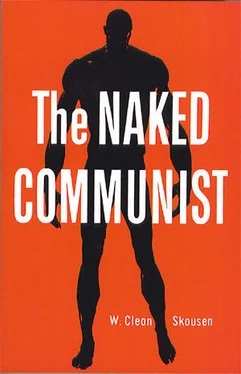From the beginning the revolution in Germany had been anemic and by May 16, 1849, it had reached a state of inglorious collapse. Marx was given twenty-four hours to quit the country. He stayed just long enough to borrow funds and print the last edition of his paper in red ink and then hastened away to find refuge in France.
But France was no refuge. Marx arrived in Paris penniless and exhausted, only to find that the Communist influence in the new Republic had wilted and died. The National Assembly was in the hands of a monarchial majority.
As soon as possible he fled from France, leaving his family to follow later because he was destitute of funds. He decided to make his permanent exile in London.
The End of the Communist League
Although Marx had to cram his family into a cheap, one-room apartment in slums of London, he felt sufficiently satisfied with their well-being to immediately concentrate his attention once again on the task of reviving the fires of the revolution. In spite of this spirit of dedication, however, Marx’s effort to lead out did more harm than good. His agitating spirit always seemed to create splinters and quarrels in the ranks of his confederates and before long he had practically cut himself off from his former associates. The Central Committee was taken out from under his influence and transferred to Cologne. There it remained until 1852 when all Communist leaders in Germany were arrested and sentenced to heavy prison terms for revolutionary activity. Marx did everything in his power to save his estranged comrades. He gathered documents, recruited witnesses and proposed various legal arguments which he thought might help, but in spite of all this yeoman service the verdicts of “guilty” pulled out of active revolutionary service every one of the party leaders then on trial. This sounded the death knell for the Communist League.
From this time on the Marx family lived in London in the most extreme poverty. A peculiar combination of emotions was expressed by Marx in his correspondence during this period. On the one hand he expressed soulful concern for the welfare of his wife and children. He confessed in a letter to Engels that the “nocturnal tears and lamentations” of his wife were almost beyond endurance. Then, in the same letter he blithely went about explaining how he was spending his whole time studying history, politics, economics and social problems so as to figure out the answers for all the problems of the world.
In 1852 his little daughter, Francisca, died. Two years later marked the passing of his young son, Edgar, and two years after that a baby died at birth.
A few paragraphs from a letter written by Mrs. Marx indicates the amazing loyalty of this woman who saw her half-fed children dying around her while their father spent days and nights in the British Museum library.
“Let me describe only one day of this life, as it actually was…. Since wet-nurses are exceedingly expensive here, I made up my mind, despite terrible pains in the breasts and the back, to nurse the baby myself. But the poor little angel drank in so much sorrow with the milk that he was continually fretting, in violent pain day and night. Since he has been in the world, he has not slept a single night through, at most two or three hours. Of late, there have been violent spasms, so that the child is continually betwixt life and death. When thus afflicted, he sucked so vigorously that my nipple became sore, and bled; often the blood streamed into his little mouth. One day I was sitting like this when our landlady suddenly appeared…. Since we could not pay this sum (of five pounds) instantly, two brokers came into the house, and took possession of all my belongings—bedding, clothes, everything, even the baby’s cradle and the little girls’ toys, so that the children wept bitterly. They threatened to take everything away in two hours. (Fortunately they did not.) If this had happened I should have had to lie on the floor with my freezing children beside me….
“Next day we had to leave. It was cold and rainy. My husband tried to find lodging, but as soon as he said he had four children no one would take us. At length a friend helped us. We paid what was owed, and I quickly sold all my beds and bedding in order to settle accounts with the chemist, the baker, and the milkman.” {6} 6 Ruhle, Otto, Karl Marx , pp. 202-204.
Thus the years passed. Literally hundreds of letters were exchanged between Engels and Marx and nearly all of them refer in one place or another to money. Engels’ letters characteristically contain this phrase: “Enclosed is a post office order for five pounds,” while Marx’s epistles are shot through with exasperated passages such as: “My mother has positively assured me that she will protest any bill drawn on her.” “For ten days we have been without a soul in the house.” “You will agree that I am dipped up to my ears in petty-bourgeois pickle.”
At one point in this bitter existence there seemed to be a sudden ray of hope. During a particularly desperate period when Engels could give no relief, Marx made a trip to Holland where a prosperous uncle generously handed him one hundred and sixty pounds. This was enough to put Marx on his financial feet, pay off his debts and give him a new start. But with money in his pocket, Marx decided to take a tour of Germany. He visited his mother in Treves, preceded to Berlin, undertook a number of drinking excursions with his old friends, had himself photographed and generally played the role of a gentleman of leisure. Two months later he returned home. Frau Marx welcomed her tourist husband thinking that now bills could be paid, clothing and furniture could be purchased and better rooms rented. She was horrified to learn that practically nothing remained of the hundred and sixty pounds.
The Founding of the First International
In 1862 a great international exhibition was held in London, to proudly parade the industrial achievements of nineteenth century capitalism. The promoters of the exhibition were desirous of creating an atmosphere of international good will and therefore invited all countries to not only submit displays but also to send representatives of their workers to exchange ideas and good will with the workers of other countries who would be in attendance.
The British labor leaders, who had been gaining strength since 1860, considered this an excellent time to set up an international workers’ organization. They therefore took, every opportunity to make firm friends with labor leaders from Italy, Germany, France, Poland and Holland. In due time they were able to establish a permanent “International” with headquarters in London. One of the leaders of this movement was a tailor named Eccarius who had formerly been a right hand man to Marx during the days of the Communist League. As soon as the new movement began to catch on, Marx was invited by Eccarius to participate.
Immediately Marx began to assert himself—but within bounds. This was the lesson he had partially learned from the failure of the Communist League. The new organization was called the International Workingmen’s Association and is frequently referred to as the First International. As long as Marx restrained himself he was able to exercise considerable influence among the labor leaders from the various countries. By careful maneuvering behind the scenes he was able to get nearly all of his ideas adopted in preference to weaker, more peaceful programs suggested by “social-minded reformers.” But all of this seemed mealy-mouthed and unnatural to Marx. He admitted to Engels he had been forced to make compromises in order to keep peace:
“My proposals were all adopted by the sub-committee. Only one thing, I had to pledge myself to insert in the preamble to the rules two phrases about ‘duty’ and ‘right’; also about truth, morality and justice-but they are all so placed that they cannot do any harm…. It will be some time before the reawakened movement will permit the old boldness of speech. We must be strong in the substance, but moderate in the form.” {7} 7 Ruhle, Otto, Karl Marx , pp. 248-249.
Читать дальше











